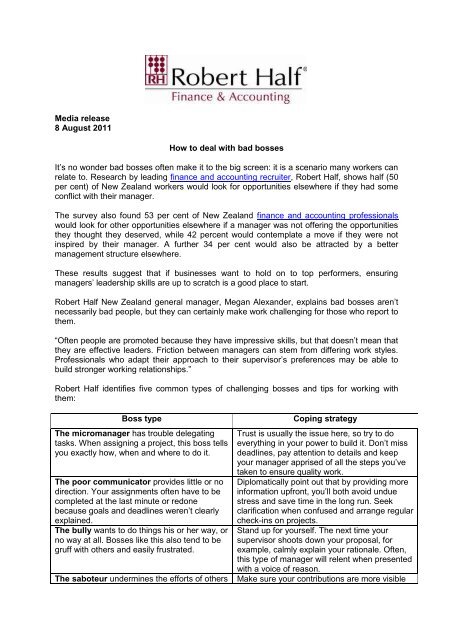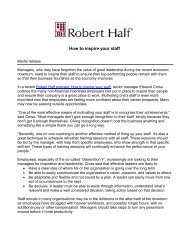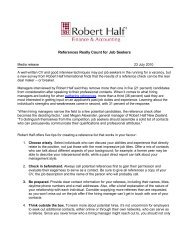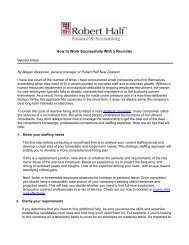How to deal with bad bosses - Robert Half
How to deal with bad bosses - Robert Half
How to deal with bad bosses - Robert Half
Create successful ePaper yourself
Turn your PDF publications into a flip-book with our unique Google optimized e-Paper software.
Media release<br />
8 August 2011<br />
<strong>How</strong> <strong>to</strong> <strong>deal</strong> <strong>with</strong> <strong>bad</strong> <strong>bosses</strong><br />
It’s no wonder <strong>bad</strong> <strong>bosses</strong> often make it <strong>to</strong> the big screen: it is a scenario many workers can<br />
relate <strong>to</strong>. Research by leading finance and accounting recruiter, <strong>Robert</strong> <strong>Half</strong>, shows half (50<br />
per cent) of New Zealand workers would look for opportunities elsewhere if they had some<br />
conflict <strong>with</strong> their manager.<br />
The survey also found 53 per cent of New Zealand finance and accounting professionals<br />
would look for other opportunities elsewhere if a manager was not offering the opportunities<br />
they thought they deserved, while 42 percent would contemplate a move if they were not<br />
inspired by their manager. A further 34 per cent would also be attracted by a better<br />
management structure elsewhere.<br />
These results suggest that if businesses want <strong>to</strong> hold on <strong>to</strong> <strong>to</strong>p performers, ensuring<br />
managers’ leadership skills are up <strong>to</strong> scratch is a good place <strong>to</strong> start.<br />
<strong>Robert</strong> <strong>Half</strong> New Zealand general manager, Megan Alexander, explains <strong>bad</strong> <strong>bosses</strong> aren’t<br />
necessarily <strong>bad</strong> people, but they can certainly make work challenging for those who report <strong>to</strong><br />
them.<br />
“Often people are promoted because they have impressive skills, but that doesn’t mean that<br />
they are effective leaders. Friction between managers can stem from differing work styles.<br />
Professionals who adapt their approach <strong>to</strong> their supervisor’s preferences may be able <strong>to</strong><br />
build stronger working relationships.”<br />
<strong>Robert</strong> <strong>Half</strong> identifies five common types of challenging <strong>bosses</strong> and tips for working <strong>with</strong><br />
them:<br />
Boss type<br />
The micromanager has trouble delegating<br />
tasks. When assigning a project, this boss tells<br />
you exactly how, when and where <strong>to</strong> do it.<br />
The poor communica<strong>to</strong>r provides little or no<br />
direction. Your assignments often have <strong>to</strong> be<br />
completed at the last minute or redone<br />
because goals and deadlines weren’t clearly<br />
explained.<br />
The bully wants <strong>to</strong> do things his or her way, or<br />
no way at all. Bosses like this also tend <strong>to</strong> be<br />
gruff <strong>with</strong> others and easily frustrated.<br />
The saboteur undermines the efforts of others<br />
Coping strategy<br />
Trust is usually the issue here, so try <strong>to</strong> do<br />
everything in your power <strong>to</strong> build it. Don’t miss<br />
deadlines, pay attention <strong>to</strong> details and keep<br />
your manager apprised of all the steps you’ve<br />
taken <strong>to</strong> ensure quality work.<br />
Diplomatically point out that by providing more<br />
information upfront, you’ll both avoid undue<br />
stress and save time in the long run. Seek<br />
clarification when confused and arrange regular<br />
check-ins on projects.<br />
Stand up for yourself. The next time your<br />
supervisor shoots down your proposal, for<br />
example, calmly explain your rationale. Often,<br />
this type of manager will relent when presented<br />
<strong>with</strong> a voice of reason.<br />
Make sure your contributions are more visible
and rarely recognises individuals for a job well<br />
done. This supervisor takes credit for<br />
employee ideas but places blame on others<br />
when projects go awry.<br />
The mixed bag is always a surprise. This<br />
manager’s moods are typically unpredictable:<br />
He or she may confide in you one day and turn<br />
a cold shoulder the next.<br />
<strong>to</strong> others, especially senior management, so<br />
that your role isn’t overlooked. Get information<br />
in writing from this person so you have a chain<br />
of communications <strong>to</strong> refer <strong>to</strong>, if needed.<br />
Try not <strong>to</strong> take this boss’s disposition<br />
personally. A calm and composed demeanour<br />
is best when <strong>deal</strong>ing <strong>with</strong> this supervisor. When<br />
this person is on edge, try <strong>to</strong> limit<br />
communication unless a matter is urgent.<br />
For more information checkout out our podcast on Dealing <strong>with</strong> a difficult boss.<br />
Ends<br />
Released on behalf of <strong>Robert</strong> <strong>Half</strong> Finance & Accounting by Goode PR, Auckland. For<br />
more information or <strong>to</strong> arrange an interview, please contact:<br />
Melissa Dobson of Goode PR, Auckland on +64 9 480 9948 or 021 389 559 or email<br />
melissa@goodepr.co.nz<br />
About the research<br />
The <strong>Robert</strong> <strong>Half</strong> workplace survey questioned more than 1,600 finance, accounting, HR and<br />
executive-level managers from four countries, including 521 from New Zealand. It was<br />
carried out in August 2010.<br />
About <strong>Robert</strong> <strong>Half</strong> International<br />
<strong>Robert</strong> <strong>Half</strong> International Inc. (RHI) pioneered specialised staffing services and <strong>to</strong>day is the<br />
world’s leader in the field. Founded in 1948, the company is traded on the New York S<strong>to</strong>ck<br />
Exchange (symbol: RHI). <strong>Robert</strong> <strong>Half</strong> International again was named FORTUNE ®<br />
magazine's "World's Most Admired Companies" list, ranking #1 in our industry in both<br />
innovation and quality of services (March 21, 2011).<br />
<strong>Robert</strong> <strong>Half</strong> New Zealand operates the divisions <strong>Robert</strong> <strong>Half</strong> Finance & Accounting, for<br />
temporary and permanent finance professionals; <strong>Robert</strong> <strong>Half</strong> Management Resources, for<br />
project financial professionals and <strong>Robert</strong> <strong>Half</strong> Technology, for high calibre technology<br />
professionals.<br />
There are more than 350 <strong>Robert</strong> <strong>Half</strong> International locations worldwide. Visit us <strong>to</strong>day:<br />
www.roberthalf.co.nz










